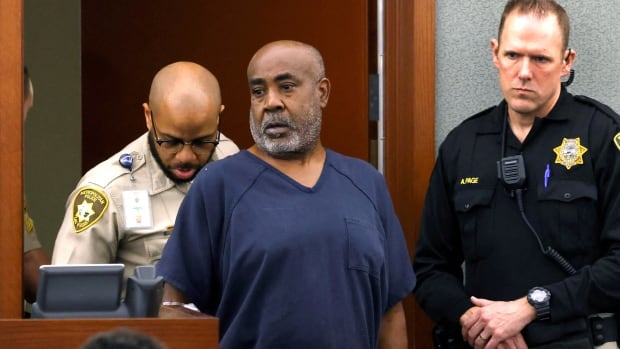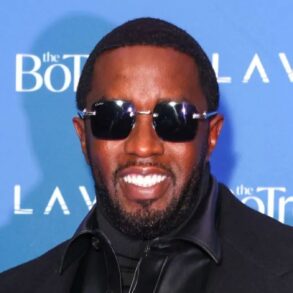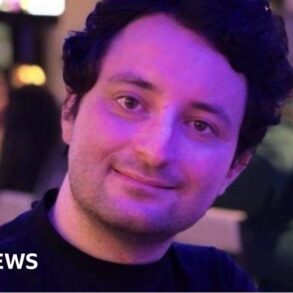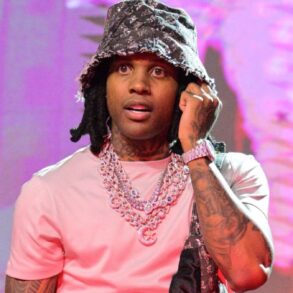
An ailing former Los Angeles-area gang leader has been denied release from a Las Vegas jail ahead of his trial in the 1996 killing of music legend Tupac Shakur, despite a bid by a hip-hop figure to underwrite his $750,000 US bond.
A Nevada judge rejected house arrest with electronic monitoring for Duane “Keffe D” Davis, 61, saying she wasn’t satisfied with assurances that Davis and his would-be benefactor — Cash “Wack 100” Jones — weren’t planning to reap profits from the sale of Davis’s life story.
A Nevada law prohibits convicted killers from profiting from their crime.
7:26What we know now about Tupac’s murder
Culture critic Ian Steaman joins host Elamin Abdelmahmoud to react to the latest arrest in the murder of Tupac Shakur, and to explain why after 26 years this unsolved case continues to resonate within today’s zeitgeist.
Clark County District Court Judge Carli Kierny said in her ruling issued Wednesday that a review of Jones’s financial records also did little to address her concerns that Jones might be a “‘front’ or ‘middleman’ for the true bond poster.”
Davis has sought to be released since shortly after his arrest last September made him the only person ever charged with a crime in Shakur’s killing, which has drawn intense interest and speculation for 27 years.
Prosecutors allege the gunfire in Las Vegas that killed Shakur stemmed from competition between East Coast members of a Bloods gang sect and West Coast groups of a Crips sect, including Davis, for dominance in a musical genre known as gangsta rap.
1st-degree murder trial set for November
Davis has pleaded not guilty to first-degree murder. His trial is scheduled for Nov. 4. If convicted, he could spend the rest of his life in prison.
After a 45-minute hearing Tuesday, Kierny said she was left with more questions than answers after Davis’s legal team tried to demonstrate the source of the funds.
Prosecutors have argued that Davis intends to benefit from retelling his story about the killing of Shakur and played a recording of a jailhouse phone call in which Jones describes to Davis a plan to produce “30 to 40 episodes” of a show based on his life story.
“It is an illegal benefit, profiting from this crime,” prosecutor Binu Palal told the judge. Palal didn’t respond to an email seeking comment Wednesday on the judge’s decision.
Jones, a music record executive who has managed hip-hop artists including Johnathan “Blueface” Porter and Jayceon “The Game” Taylor, offered sworn testimony Tuesday by video from an unspecified place in California.
He said he paid 15 per cent of the bail amount, or $112,500 US, as “a gift” from his business accounts to secure Davis’s release.
Davis’s attorney, Carl Arnold, didn’t respond to emails or phone calls left at his office Wednesday seeking comment. A spokesperson for Arnold didn’t immediately have comment when reached by email.
The judge said in Wednesday’s two-page order she wasn’t convinced the bail money was not being paid “out of profits from Mr. Davis discussing the killing of the victim in this case.”
While Jones testified he was bonding out Davis because Davis was fighting cancer and “had been a pillar of the community,” previous interviews “suggested another motive,” Kierney wrote.
She said Jones indicated there were “stipulations” on the bond and “that Mr. Davis would be signing a contract regarding the rights to his life story, ostensibly including the shooting of Mr. Shakur.” She said that was supported by a recorded phone call at the jail when Jones “insisted that a contract be signed before the bond premium was paid.”
Davis has described himself as orchestrator, not gunman
Public defenders who represented Davis before he hired Arnold said in December he wasn’t getting proper medical care in jail following a bout with colon cancer that they said was in remission.
According to police, prosecutors and Davis’s own accounts, he is the only person still alive among four people who were in a white Cadillac from which shots were fired in September 1996, mortally wounding Shakur and grazing rap mogul Marion (Suge) Knight at an intersection just off the Las Vegas Strip. Knight, now 59, is serving 28 years in a California prison for using a vehicle to kill a Los Angeles-area man in 2015.
Davis’s nephew, Orlando (Baby Lane) Anderson, who was in the back seat of the Cadillac, denied involvement in Shakur’s death and died in a May 1998 shooting in Compton. The other back seat passenger, DeAndre (Big Dre) or (Freaky) Smith, died in 2004. The driver, Terrence (Bubble Up) Brown, died in a 2015 shooting in Compton.
Davis has publicly described himself as the orchestrator of the shooting, but not the gunman. A renewed push by Las Vegas police to solve the case led to a search warrant and raid last July at his home in Henderson.
Prosecutors say they have strong evidence to convict Davis of murder based his own accounts during multiple police and media interviews since 2008 — and in a 2019 memoir of his life leading a Compton street gang.
In his book, Davis wrote he was promised immunity to tell authorities in Los Angeles what he knew about the fatal shootings of Shakur and rival rapper Christopher Wallace six months later in Los Angeles. Wallace was known as The Notorious B.I.G. or Biggie Smalls.
Arnold maintains that Davis told stories so he could make money, and that police and prosecutors in Nevada lack key evidence, including the gun, the Cadillac and proof that Davis was in Las Vegas at the time of the shooting.
This post was originally published on this site be sure to check out more of their content.






